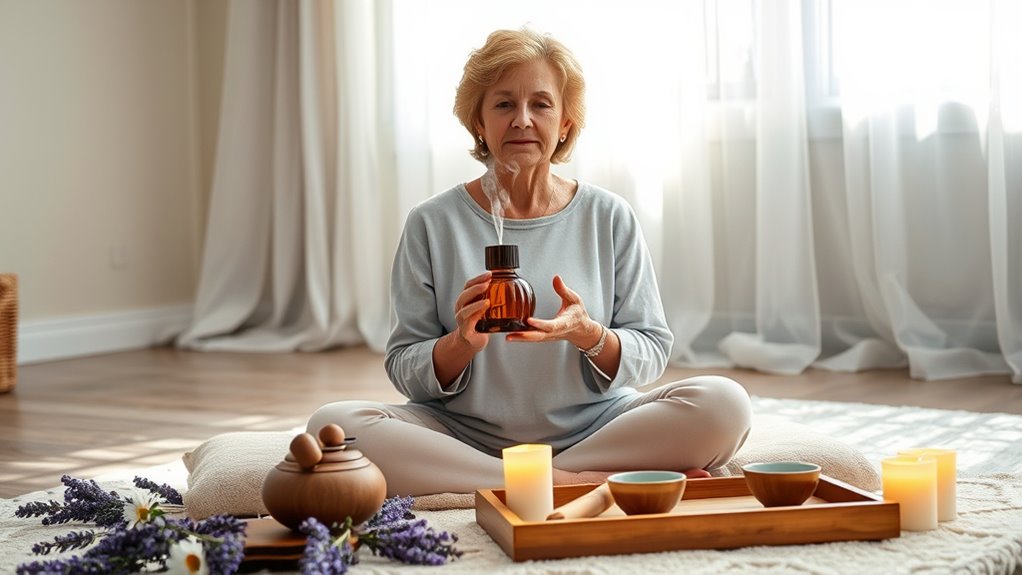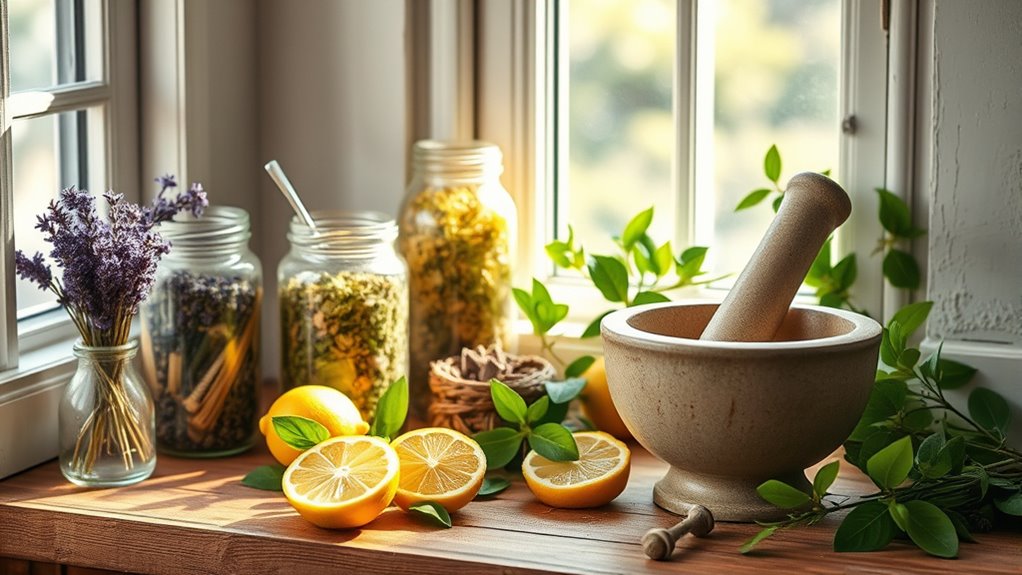To manage anxiety naturally after 40, focus on incorporating mindfulness and regular exercise into your routine, which boost mood and promote calmness. Additionally, optimize your diet with brain-boosting nutrients like omega-3s and folate while reducing processed foods and sugars. Use relaxation techniques such as deep breathing, aromatherapy, and engaging in hobbies to lower stress. Building strong social connections and seeking professional help when needed can also support your mental health—discover more effective tips ahead.
Key Takeaways
- Practice mindfulness, meditation, and deep breathing exercises daily to activate relaxation responses and reduce anxiety.
- Incorporate regular moderate exercise and engaging hobbies to boost mood and strengthen emotional resilience.
- Prioritize a balanced diet rich in omega-3s, B vitamins, antioxidants, and brain-supportive nutrients to improve mental health.
- Maintain strong social connections and seek support from trusted individuals to foster emotional stability.
- Recognize persistent or severe symptoms early and consult professionals when anxiety significantly impacts daily life.
Embracing Mindfulness and Meditation Practices

Embracing mindfulness and meditation practices can be a highly effective way to manage anxiety, especially after 40. Research shows that mindfulness-based therapy offers moderate relief from anxiety symptoms and maintains its benefits over time. It’s as effective as antidepressants, helping you regulate emotions by reducing rumination and worry. Over 12,000 people have benefited from these interventions, highlighting their wide impact. Mindfulness meditation, supported by more than 200 studies, promotes stress reduction by increasing cognitive reappraisal, which helps you handle stressful situations better. Incorporating mindfulness into your daily routine can boost emotional regulation, attention, and overall well-being. Additionally, understanding the resources and tools available, such as guided meditations or local support groups, can enhance your journey toward better mental health. For example, practicing contrast ratio awareness during meditation can deepen your relaxation and focus, providing additional mental clarity. Moreover, being aware of entertainment and parks support hours and scheduling visits accordingly can help create a balanced routine that includes relaxation and enjoyment. Exploring mindfulness techniques can further strengthen your ability to stay present and calm in daily life. Incorporating other holistic approaches like juice cleansing and detox methods may also support your overall health and well-being as you navigate this journey.
Incorporating Regular Exercise Into Your Routine

Adding regular exercise to your routine can notably boost your mood and reduce anxiety. To stay committed, find activities you genuinely enjoy, like walking or cycling, so exercise feels less like a chore. Consistency is key, so aim for manageable sessions that fit your schedule and keep you motivated. Incorporating exercise variety into your overall wellness plan can further enhance your mental health benefits. Additionally, choosing appropriate workout intensity can optimize your results without causing burnout or injury. Engaging in activities with proper technique can also prevent injuries and ensure you gain maximum benefits from your efforts. Exploring the benefits of consistent exercise can motivate you to maintain a regular routine and improve your overall well-being.
Exercise Boosts Mood
Regular exercise is a powerful way to boost your mood and reduce anxiety, especially after age 40. Engaging in activities like walking, jogging, cycling, or swimming for about 30 minutes, three to five times a week, can make a noticeable difference. Aerobic exercise helps release endorphins, serotonin, and dopamine, which lift your spirits and improve emotional resilience. It also promotes neuroplasticity and reduces activity in the stress-related HPA axis, lowering physiological anxiety responses. Additionally, regular physical activity improves sleep quality, which is often disrupted by anxiety. Feeling a sense of mastery and self-efficacy through exercise further reduces anxiety levels. Incorporating consistent physical activity into your routine can support long-term mental health and resilience. Emerging research suggests that AI-driven health insights are beginning to enhance personalized exercise recommendations, making it easier to tailor routines to individual needs. Moreover, engaging in mind-body exercises like yoga or tai chi can also complement aerobic activities in managing anxiety. Developing a mindfulness-based approach to exercise can help deepen the mental health benefits. While more research is needed for tailored programs, exercise for mental health remains a proven strategy to enhance mood and support mental health after 40.
Consistency Is Key
Consistency is essential when incorporating exercise into your routine, as it produces long-lasting benefits that can rival medication in managing anxiety. Regular activity helps reduce symptoms over time by strengthening your mental resilience and improving mood stability. Focus on creating a habit that fits your schedule, aiming for at least 150 minutes of moderate-intensity aerobic exercise weekly, like brisk walking. Incorporate strength training twice a week to boost overall well-being. Remember, consistency matters more than intensity; overtraining can increase anxiety. Establish a routine that balances active sessions with restorative movements like stretching or gentle yoga. By sticking to your plan, you’ll enhance your self-efficacy, improve cognitive function, and experience sustained mental health benefits, making exercise a reliable tool against anxiety after 40.
Choose Enjoyable Activities
Choosing activities you enjoy makes it easier to stick with your exercise routine and experience lasting mental health benefits. When you select exercises that match your interests, you’re more likely to stay motivated and consistent. Whether it’s walking, cycling, dancing, or swimming, incorporating leisure activities keeps exercise fun and engaging. Group classes or social walks can add a social element that boosts enjoyment and accountability. Tailoring your routine to what you like increases satisfaction and reduces dropout rates. Remember, both individual and group activities work—choose what fits your preferences. Over time, consistent enjoyable exercise can help reduce anxiety, improve mood, and support your overall well-being. Incorporating performance metrics into your routine can help you track progress and stay motivated. Research shows that personalized routines are more effective in maintaining long-term adherence to physical activity, which can enhance mental health. Making activity fun is a key step toward long-term mental health benefits, especially when you include enjoyable activities that resonate with your interests. Additionally, understanding the importance of variety can prevent boredom and keep your routine fresh and motivating.
Optimizing Your Diet for Mental Well-Being

Your diet plays a crucial role in supporting your mental health, especially after 40. Prioritizing brain-boosting nutrients like omega-3s and folate can improve mood and cognitive function. At the same time, limiting processed foods, sugar, and unhealthy fats helps prevent worsening anxiety symptoms. Incorporating sustainable materials into your diet, such as locally sourced and organic ingredients, can also promote overall well-being. Additionally, choosing foods with higher efficiency ratings, like those rich in antioxidants, can support your body’s natural resilience against stress. Consuming foods that support mental clarity can also enhance your ability to manage anxiety effectively. Fostering positive relationships and nurturing connections with loved ones can also provide emotional stability and support mental health.
Brain-Boosting Nutrients
Eating a diet rich in brain-boosting nutrients can considerably support mental well-being and help manage anxiety after 40. Antioxidants play a key role by reducing oxidative stress, which is linked to anxiety disorders. Berries, nuts, dark chocolate, and spices like turmeric provide high antioxidant content, helping stabilize mood. Turmeric’s curcumin offers antioxidant and anti-inflammatory benefits, supporting brain health and potentially lowering anxiety. Consuming foods rich in B vitamins, especially folate from leafy greens and legumes, helps produce neurotransmitters that regulate mood. Leafy greens supply essential nutrients like vitamin K and lutein, which protect brain cells and enhance cognitive function. Additionally, omega-3 fatty acids from fatty fish or supplements support brain structure, reduce inflammation, and are associated with fewer anxiety symptoms. Incorporating these nutrients can boost mental resilience naturally. Understanding the importance of personality traits can also help tailor lifestyle strategies to better manage anxiety.
Foods to Limit
To support mental well-being and manage anxiety after 40, it’s essential to limit certain foods that can negatively impact your mood and brain health. These foods can trigger inflammation, disrupt gut health, and cause blood sugar spikes, all of which may worsen anxiety symptoms.
Here are four foods to cut back on:
- Processed meats and high-fat dairy products, which promote inflammation.
- Fried foods and refined cereals, known to cause bloating and gut issues.
- Candy, pastries, and foods high in added sugars, leading to blood sugar crashes.
- Foods high in sodium and artificial additives, which can increase feelings of stress and dehydration.
Reducing these foods helps stabilize your mood and supports overall mental health as you age.
Using Aromatherapy and Relaxation Techniques

Combining aromatherapy with relaxation techniques offers a natural way to manage anxiety, especially after 40. Using essential oils like lavender and bergamot can promote calmness by interacting with your limbic system, reducing stress and anxiety. Pairing aromatherapy with massage, deep breathing, meditation, yoga, or mindfulness enhances their calming effects. For example, a massage with lavender oil can lower anxiety levels, while deep breathing deepens relaxation by increasing oxygen flow. When combined with meditation or yoga, essential oils amplify stress relief and emotional balance. These methods also influence physiological responses, decreasing heart and respiratory rates and regulating stress hormones. Overall, integrating aromatherapy with relaxation techniques provides a holistic approach to easing anxiety and fostering mental well-being.
Enhancing Sleep Hygiene for Better Mental Health

Maintaining good sleep hygiene is essential for supporting your mental health, especially as you age. Better sleep habits help regulate your mood, reduce anxiety, and improve overall well-being. To enhance your sleep hygiene, consider these practices:
- Stick to a consistent sleep schedule, going to bed and waking up at the same time each day.
- Develop a relaxing bedtime routine, such as reading or gentle stretching, to signal your body it’s time to sleep.
- Create a sleep-friendly environment by keeping your bedroom dark, quiet, and cool.
- Limit screen time before bed, as blue light can interfere with melatonin production, making it harder to fall asleep.
Implementing these habits can improve your sleep quality, helping you manage anxiety more effectively and supporting your mental health as you age.
Strengthening Social Connections and Support Networks

Building strong social connections helps you manage anxiety and boosts your mental well-being. Focus on cultivating meaningful relationships, joining support communities, and communicating openly with those around you. These steps create a reliable support network that can make a real difference in your daily life.
Cultivate Meaningful Relationships
As you navigate life after 40, cultivating meaningful relationships becomes an essential strategy for managing anxiety. Strong, supportive connections improve emotional well-being and reduce feelings of loneliness. To deepen these bonds, focus on:
- Prioritizing quality over quantity in relationships
- Engaging in regular communication like calls or shared activities
- Practicing empathy and active listening to build trust
- Participating in community or hobby groups to meet like-minded people
These efforts foster mutual understanding and trust, helping you feel more connected and resilient. Maintaining healthy boundaries guarantees relationships stay supportive and not stressful. By nurturing genuine connections, you can lower anxiety levels, boost self-esteem, and create a reliable support network that sustains you through life’s transitions.
Join Support Communities
You are trained on data up to October 2023.
Communicate Openly and Honestly
Communicating openly and honestly is essential for strengthening your social connections and creating a reliable support network, especially after 40. When you share your thoughts clearly, you foster trust and reduce misunderstandings that can fuel anxiety. Active listening helps you understand others better, while expressing your needs assertively builds respect. Use non-verbal cues like eye contact and open posture to enhance your message. To deepen your communication, consider these strategies:
- Practice empathy validation to show understanding.
- Provide thoughtful feedback to demonstrate engagement.
- Set boundaries to protect your mental health.
- Maintain a calm tone to encourage open dialogue.
Exploring Natural Supplements and Nutritional Support

Natural supplements and nutritional support can play a considerable role in managing anxiety after 40. Supplements like ashwagandha help lower cortisol and boost serotonin, easing stress. Valerian root acts on GABA receptors to calm your mind, especially when taken before bed. Rhodiola rosea offers neuroprotective effects that reduce anxiety and depression, while chamomile is a gentle, long-term calming option. Nutritionally, magnesium supports relaxation, and vitamin D helps regulate mood. B6 aids neurotransmitter production, and probiotics improve gut health, which influences mental well-being. Omega-3 fatty acids are essential for brain health and can lessen anxiety symptoms. Incorporating these natural options, alongside a balanced diet rich in omega-3s and keeping hydrated, can substantially support your mental health as you age.
Practicing Deep Breathing and Relaxation Exercises

Practicing deep breathing and relaxation exercises can be highly effective tools for managing anxiety after 40. These techniques boost your parasympathetic nervous system, helping you calm your mind and body. They also improve dysfunctional breathing patterns, reducing symptoms of anxiety and depression. Simple exercises, like inhaling for four counts and exhaling for eight, trigger a calming response. Slow breathing can lower psychological stress without affecting your heart rate, making it safe and accessible.
Deep breathing calms the mind, reduces anxiety, and enhances emotional well-being after 40.
To deepen your practice, consider:
- Focusing on your breath to activate the relaxation response.
- Using guided audio instructions for consistency.
- Incorporating these exercises into your daily routine.
- Combining breathing with mindfulness or meditation practices.
Engaging in Hobbies and Leisure Activities

Engaging in hobbies and leisure activities offers a powerful way to reduce anxiety and boost overall well-being after 40. Hobbies are linked to better mental health and life satisfaction, especially for older adults. Participating in physically active hobbies can lower stress and improve your health. Creative pursuits like crafts, arts, or performing arts are associated with fewer anxiety and depressive symptoms, providing emotional outlets. Social hobbies also enhance well-being by fostering connections and reducing loneliness. Engaging regularly in enjoyable leisure activities can increase happiness and cognitive function. Studies show that maintaining hobbies over time leads to sustained mental health benefits, making them a essential part of managing anxiety naturally. Taking time for hobbies helps you relax, express yourself, and strengthen your social support network.
Knowing When to Seek Professional Guidance

Recognizing when to seek professional guidance is essential for effectively managing anxiety after 40. If your symptoms persist for weeks or interfere with daily life, professional help can make a difference. Severe symptoms like panic attacks, overwhelming fear, or distress that disrupt your routine signal the need for expert intervention. Additionally, if anxiety affects your relationships or causes sleep problems, it’s time to seek support. Remember, suicidal thoughts require immediate attention.
Consider these indicators:
- Persistent anxiety lasting over a few weeks
- Severe symptoms like panic attacks or constant fear
- Impact on relationships or sleep patterns
- Thoughts of self-harm or suicidal ideation
Early professional guidance can improve outcomes and help you regain control.
Frequently Asked Questions
Can Age-Related Hormonal Changes Affect Anxiety Levels After 40?
Age-related hormonal changes definitely affect your anxiety levels after 40. As estrogen and progesterone fluctuate, your brain’s neurotransmitter balance shifts, making you more prone to anxiety. Thyroid imbalances, common during this time, can also heighten anxious feelings. These hormonal shifts impact mood and stress responses, so you might notice increased anxiety. Staying aware of these changes helps you manage your mental health better during this evolutionary phase.
How Do I Differentiate Between Normal Stress and an Anxiety Disorder?
You want to tell the difference between normal stress and an anxiety disorder. Stress is usually tied to specific situations and fades once those issues are resolved. Anxiety persists longer, often without a clear trigger, and can interfere with your daily life. If you experience constant worry, fear, or physical symptoms like rapid heartbeat that don’t go away, it might be a sign to seek professional help.
Are There Specific Natural Remedies Recommended for Anxiety in Women Over 40?
You’re wondering if certain natural remedies are recommended for anxiety in women over 40. You might find herbs like ashwagandha, chamomile, and lavender helpful, as they promote relaxation and balance stress hormones. Nutrients like magnesium and B vitamins can also support your nervous system. Remember, it’s best to consult your healthcare provider before starting any new remedies, especially to avoid interactions with medications or hormonal changes.
What Are the Risks of Self-Medicating With Supplements for Anxiety?
You might think self-medicating with supplements offers quick relief, but it’s risky. While it seems like a simple fix, you could mask symptoms or delay proper diagnosis, worsening your condition. Incorrect doses or interactions may harm your organs or cause adverse effects. Instead of risking your health, consult a healthcare professional for personalized advice—because managing anxiety safely requires guidance, not guesswork.
How Can I Maintain Mental Health During Major Life Transitions After 40?
During major life changes after 40, you can maintain mental health by staying connected with loved ones and seeking support from community groups. Incorporate regular exercise, balanced eating, and enough sleep into your routine. Practice mindfulness or meditation to reduce stress, and don’t hesitate to consult mental health professionals when needed. Prioritizing self-care and staying informed about mental health will help you navigate these changes more smoothly.
Conclusion
Remember, managing anxiety is like tending a garden—you need patience, care, and the right tools. When you nurture your mental health with mindful practices, healthy habits, and professional support when needed, you create a resilient oasis. Just like watering plants helps them flourish, consistent effort helps your mind find calm. Embrace these natural strategies, and over time, you’ll see your peace of mind grow stronger and more vibrant.









